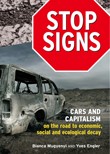Ever since its inception, the car has been admired as the pinnacle of modern progress, as well as independence and adulthood. In the United States alone, there are 246 million registered cars with 210 million licensed drivers behind their wheels.
In Stop Signs, by Bianca Mugyenyi and Yves Engler, individuals who cannot exist without their four-wheeled machinery, are labelled homo automotivis and come under scrutiny. Divided into two parts, Stop Signs juxtaposes personal travel anecdotes from the authors’ car-less journey around America (and the challenges arising from this vehicle-less state) with a thorough and intersectional analysis of the automobile’s damaging influence on various spheres of life.
In the authors’ view, the car is responsible not only for crimes of environmental damage, but also for causing racial disputes, capitalist greed, and even the oversimplified nature of modern art. (“Lone circles and black squares as art? Blame the car.”) Some of the negative outcomes of the car are familiar, such as the destruction of the natural environment through oil industry activity, road construction, and carbon emissions. Other startling and more insidious consequences of cars and the urban development surrounding them are highlighted, such as the destruction of ethnic communities by highway construction that cuts through them (Atlanta, Georgia) or by suburban sprawl that drives out local businesses.

Stop Signs
Cars And Capitalism On The Road To Economic, Social And Ecological Decay
Bianca Mugyenyi and Yves Engler
Red Publishing
$21.00
paper
259pp
9781552663844
The authors’ resolution to achieve a car-less state is truly radical and without compromise. Rather than encouraging the many passive forms of car resistance that focus on individual abstention rather than systemic change, Mugyenyi and Engler urge readers to consider how government and labour systems must change in order to achieve a true pedestrian utopia.
The reading experience is not always a smooth one. For most of the book, the authors discuss their findings, relegating their travel experiences to the first few paragraphs of each chapter. The switch between the “subjective” travel account and the “objective” facts is often abrupt.
Though Mugyenyi and Engler effectively use sources already published to make their point, the absence of first-hand conversation with at least some of the activists they quote seems like a missed opportunity for original and updated information. Furthermore, the lack of copy-editing produces glaring spelling errors that are distracting at times (“MacDonald’s” and “McDonald’s” on the same page, as well as “Wall Mart” and “Wal-Mart”).
Minor errors aside, Engler and Mugyenyi’s activist backgrounds give the book its unique and impassioned tone, whether they are juggling the personal account of getting around the United States on Greyhound buses or synthesizing all existing facts about the automobile industry. The result is a smart and expansive critique of car-dependent North America that is convincing and frightening. This book is an eye-opener for everyone – from the stubborn car-lover to the anti-car activist who wants to brush up on the facts. mRb






0 Comments